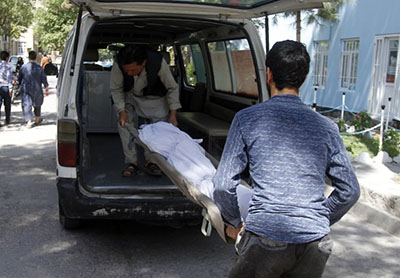KABUL, Afghanistan — A roadside bomb tore through a bus in western Afghanistan on Wednesday, killing at least 32 people, including children, a provincial official said.
Mohibullah Mohib, spokesman for the police chief in Farah province, said the explosion also wounded 15 people. Most of the wounded were said to be in critical condition, indicating the death toll could rise.
The bus was traveling on a main highway between the western city of Herat and the southern city of Kandahar.

Afghans assist a wounded man in a hospital after a roadside bomb on the main highway between the western city of Herat and the southern city of Kandahar, in Herat, Afghanistan, Wednesday, July 31, 2019. A roadside bomb tore through a bus in western Afghanistan on Wednesday, killing at least 32 people, including children, a provincial official said. (Photo: Hamed Sarfarazi/AP)
No one immediately claimed responsibility, but the Taliban operate in the region and frequently use roadside bombs to target government officials and security forces. The Islamic State group’s affiliate in Afghanistan is also known to have been behind attacks in the area. IS militants frequently target civilians, especially the country’s minority Shiites.
U.N. Secretary-General Antonio Guterres strongly condemned Wednesday’s attack and reiterated that “international humanitarian law explicitly prohibits indiscriminate attacks and attacks directed against civilians,” U.N. spokesman Stephane Dujarric said.
The U.N. chief appealed to all parties to the conflict to uphold their obligations to protect civilians, Dujarric said.
The Taliban have kept up a steady tempo of attacks even as they have held several rounds of peace talks with the United States aimed at ending the 18-year war.
The attack came a day after the U.N. mission in Afghanistan released a report saying that most civilian deaths in the first half of the year were caused by Afghan forces and their international allies. The report apparently referred to civilians killed during Afghan and U.S. military operations against insurgents.
The U.N. report said 403 civilians were killed by Afghan forces in the first six months of the year and another 314 by international forces, a total of 717. That’s compared to 531 killed by the Taliban, an Islamic State affiliate and other militants during the same period. It said 300 of those killed by militants were directly targeted.
The U.N. said the leading cause of civilian deaths and injuries was “ground engagements,” which caused one in three casualties. Roadside bombs were a close second, accounting for 28%. Afghanistan is one of the most heavily mined countries in the world — a legacy of decades of war.
A spokesman for President Ashraf Ghani on Wednesday disputed the results and methodology of the U.N. report, saying the government is committed to protecting civilians.
Sediq Sediqqi said the Taliban were the “major cause” of civilian deaths and accused them of deliberately targeting schools, mosques and hospitals. He said “we are sorry” for civilian casualties during Afghan security operations, but accused the Taliban of using civilians as human shields. He also said the U.N. had drastically undercounted the number of civilians killed by the Taliban.
The Taliban, who effectively control half the country, have been meeting with U.S. envoy Zalmay Khalilzad since late last year. They appear to be closing in on an agreement whereby American forces would withdraw from Afghanistan in return for guarantees that it would not be used as a launch-pad for international terror attacks.
Khalilzad has been in Kabul for talks with Afghan officials over the past several days and is expected to go to Islamabad next.
The Afghan government has been largely sidelined in the Taliban-U.S. talks, with the insurgents refusing to negotiate with Kabul officials.
Associated Press writer Edith M. Lederer contributed to this report from the United Nations.



